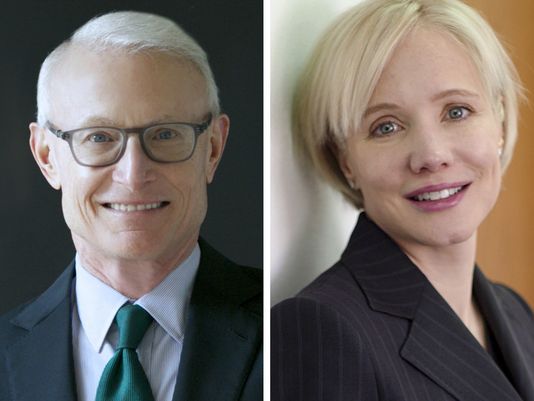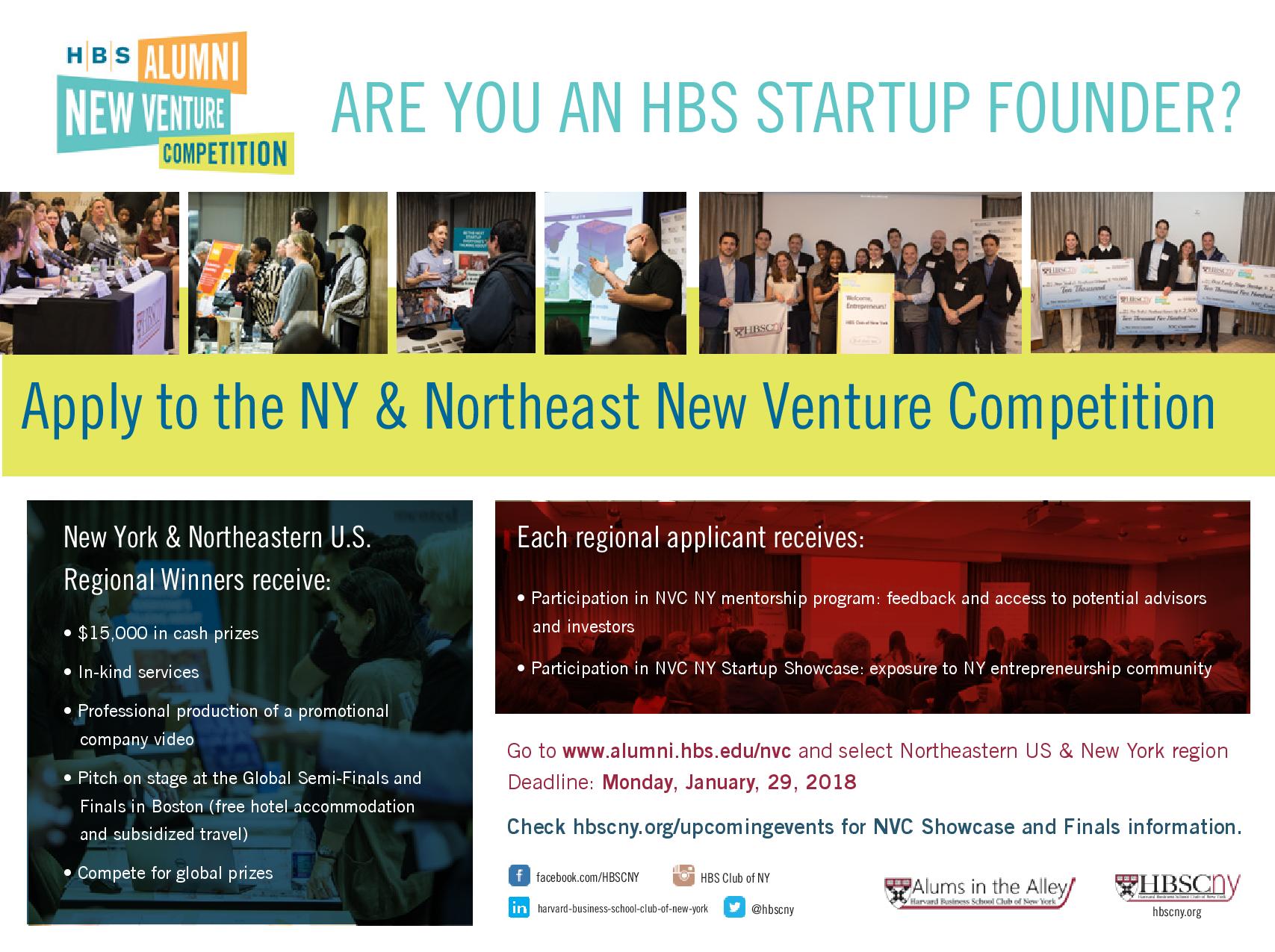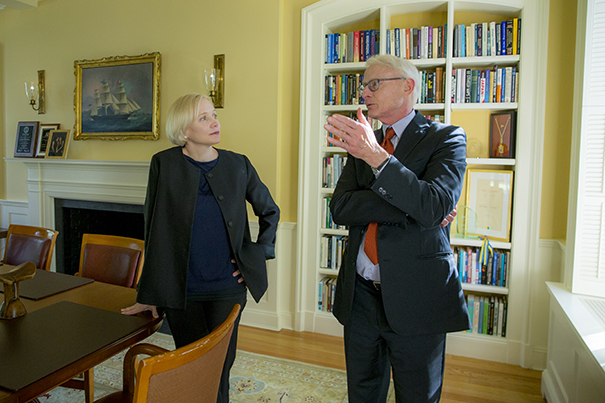

After the release of their much anticipated report – Why Competition in the Politics Industry is Failing America – Harvard’s Michael Porter and business executive and political innovation activist Katherine Gehl sat down with Kenneth Zauderer (MBA ’18) to share a bit of color on their findings, what led them to take a business lens to the ‘political industry,’ and why MBAs and other students are best-positioned to change the status quo.
KZ: Historically, your [Michael Porter] research has primarily been about business and you [Katherine Gehl] come from a business background as an executive. So, on its surface, politics seems like a departure for both of you. What made you interested in researching the U.S. political industrial complex, as you describe it in your research?
KG: I have always been interested in politics. I worked in government in Chicago and then started being active in partisan politics – originally as a Republican and then a Democrat. I spent a lot of time working for the election of Barack Obama, all in for hope and change. After that election, I paid particular attention to what was happening in Washington, D.C., and I was very disappointed by the results out of the entire political system. At that point, I was still a CEO running my company, so I turned to working not so much on partisan candidates but on policy. I joined the CEO Fiscal Leadership Council and Fix the Debt, but ultimately determined that it’s not a policy problem. I came across some early work of some influential thinkers in this field, such as Mickey Edwards (formerly taught at the Harvard Kennedy School and Harvard Law School), who explained that the system works how it’s designed to work. Once I understood that it was a design problem, it all followed from there. I was familiar with and a fan of Michael and Jan Rivkin’s U.S. Competitiveness work, which showed the political system in the bottom left of their matrix [results of a survey to alumni on elements of the U.S. business environment that help or hurt U.S. Competitiveness]. Michael and I had worked together on a business strategy at my company [Gehl Foods] and we used the Five Forces framework. There came an opportunity to use that lens to analyze politics. It absolutely sheds new light on what the problem is.
MP: My path to this is a bit more linear in that the U.S. Competitiveness work brought us to the realization that a) we were underperforming, b) our underperformance was fairly clear, c) what needed to be done was fairly clear, and d) there was consensus on what needed to be done, but nothing had been done. The only explanation for that was the political system. I engaged enough with political leaders to have them say that, too. It wasn’t just a guess. Katherine and I talked and she revealed more dimensions of the system. At some point, we decided to take the leap and actually try and do this analysis, which is not easy to do. To take a blank sheet of paper and try to figure out how to apply industry structure to politics is not easy. It started with a flip-chart and writing out all the pieces of the analysis and has been a two-year process.
KZ: In the research, you describe that the parties and their collaborators are very powerful, built over decades of creating a system that works for them. Taking them on, in some ways, is personally risky. How did you get comfortable doing this and has there been any pushback?
KG: I hope there is a lot of pushback because it means the ideas and concepts are widely discussed in a way that matters. The general feedback has been positive, even the ‘behind-closed doors’ feedback. When it starts to adjust competition, there will be real pushback and I hope we get there sooner rather than later.
I can say for myself, I am comfortable doing this because it’s fundamentally what matters. Every other issue that I have been passionate about cannot be addressed until you deal with this gating factor. There’s an organization that deals with money in politics and they call it “Issue One.” I think “Issue One” is the unhealthy competition in the political industry. Everything else is a result of, or at the least very least, cannot be solved, unless issue one is dealt with.
MP: I found this work to be very unsettling to do, not so much because I was concerned about the party pushback, but rather I was mostly concerned about getting it right. This is not a familiar field. I haven’t read everything in the political science literature; there are a gigantic number of experts. What we find here is the experts are not used to thinking this way, they very quickly devolve into micro-detail.
What makes me comfortable with the work is two things: One, a lot of people in the system are pretty well-meaning and some are the personification of everything we’re talking about. There are many people in this system that will come to support this and find this a much better way to spend their life working in government. Many people got into the system not understanding it. I think we will find allies in the Mitt Romneys, the Evan Bayhs, and many other very distinguished leaders. You read recent quotes by John McCain and you can hear his anguish over what the system has become. Two, I believe that the parties have no answer. What are the parties going to push back and say? Are they going to say that this is good? Don’t get anything done? It’s good that we pass no legislation? In a way, I think this is one of those issues where it’s pretty hard to argue that we’re not on the right side of history here and the right side of what’s good for society.
I work in healthcare extensively and the central concept in my work was the notion of “value for patients” and that led to a framework of some complexity. Frankly, I never got any pushback. It’s very hard for a physician to look me in the eye and say, “No, we shouldn’t care about value for patients, we should do this for us, not because the patient is going to get better.” I think we’re sort of in that position with the politics research. The only thing you hear from partisan folks today is, “You’re overstating the parties; they’re not that powerful.” Well, the whole game is designed around them and the results we’re getting are reflecting that game.
We also want to make sure that people didn’t think we were calling them out for being Democrats or Republicans. That’s why we go out of our way to say we’re not against anybody, but we’re against something that maybe even they didn’t understand as a member of the party or as a lifelong party supporter. It’s going to be hard for people to give up the kind of identification with the parties that they’ve had historically.
KG: We’re not in a debate with political science literature. We say in our report that we are bringing a new and different analytical lens that has been used for decades to analyze the performance of other industries and understand the nature of competition in those industries. It sheds light on this industry; it doesn’t mean it’s the only way to ever look at an industry or that other disciplines don’t have something to say.
KZ: What are the top findings that you would want someone to take away from the research?
MP: I think the number one finding is that this industry was constructed by the actors: they set the rules. The industry is designed to benefit the parties and the system, not the public. There are a lot of things that wrap around those high-order concepts. There is pretty much nothing about politics in the Constitution. Most people think that the government was set up this way by our Founders. I think that this confusion is probably the most important single thing people have to understand. Then, understanding that the system as a duopoly leads to a lot of differents ways of thinking about how they actually compete versus some stylized view that all competition is good competition and will lead to better products and services. In this case, all of those rules are completely violated. The fiercer competition gets, the worse the results and the worse the product.
KG: Absolutely. That’s the core thing that you start with – how the industry is designed. Then, you have to know, as Michael indicated, that the rules of every game – in business, in politics, in sports – affect the way the game is played. These rules in politics are made up. Most of the way things are done have been constructed over the years and sometimes they are just practices, habits, and customs. Yet, they powerfully incent the behaviors that we see. The really good news is that because they’re made up, they belong to us, and we can change them. If we took the collective investment that is currently spread across innovations and reforms that aren’t at the intersection of powerful and achievable and reallocated them to reforms that could make a difference, that would really matter. Additionally, if we took all of the energy that’s spent commenting on what’s occurring and redirected that into taking action to change the incentives, then we’ll finally have something to comment on that isn’t such bad news.
I think it’s also an important point to make that Michael and I are not taking a partisan view in this work. We’re also not anti-party. Parties are totally fine. What we’re not fine with is the nature of competition that they’ve currently colluded to create and what we want is to see the threat of new competition. It’s okay if new competition doesn’t replace the parties as long as the new competition injects incentives for these two players to do the job they’re supposed to do and create policies, solutions, action, and broad-based buy-in that are in the public interest.
KZ: The report does talk about some of those powerful and achievable objectives – fixing gerrymandering, the Senate fulcrum strategy, and a few others. What solutions do you think are at the cusp of being achieved and how are MBA students uniquely positioned to be drivers of change in that area?
MP: I think there is a lot of activity at the federal and state levels around some of the election reforms. It’s probably the single biggest thing going on because people get that. Some of those are ranked-choice voting, partisan primaries, and non-partisan redistricting. Those things, particularly gerrymandering, trigger outrage. People will eventually understand just how powerful the other areas the report rolls out are.
I think the first order impact of MBAs is to be attuned to what’s going on in your state where you’re a voter and engaging, not just personally by showing up and voting, but also engaging by spreading the word among other people who may not have been exposed to this thinking. We’re hoping that when we do have a ballot measure in this state on ranked-choice voting, there will be a surge of votes they’ve never seen before from communities they’ve never seen before, because MBA students, and also Law students and Kennedy School students, are outraged and offended by what’s going on. And, that’s been exacerbated by the Donald Trump presidency.
I also think that because people have grown up in the system over 20, 30, 40 years, there’s inertia here. Younger people that haven’t spent their entire life in that world and behaving in that way. They are better candidates to lead the charge of reform. It’s hard for older generations to really get on board here but hopefully the MBA students of today and the other professionals are going to hopefully lead the charge.
KG: MBA students should invest long-term in caring about these systemic reforms, but MBA students and everyone else should also engage in injecting near-term competition into the system as soon as they can, i.e., 2018, because near-term competition, such as the Senate Fulcrum Strategy, as designed by the Centrist Project, not only begins to alter the incentives, but critically, it provides momentum to actually drive forward the systemic reforms. In the end, the systemic reforms will be successful when championed by candidates who run and win. You will never get rid of the human desire to look for the next great candidate. Now, if we are looking for the next great candidate who comes saying that we need these reforms, then you will capture the imagination of the public. I want to see people and MBA students investing time in Voter Choice Massachusetts to get a ballot referendum on ranked-choice voting. I want to see them working with represent.us to work on anti-corruption measures. But, in the meantime, let’s elect some candidates who are running outside of the duopoly. Let’s discard the idea that they don’t make a difference and they’re spoilers, because they are actually our greatest opportunity right now to make a difference.
Disclosure statement:
Katherine Gehl is on the Board of The Centrist Project, and a donor and fundraiser for a variety of political reform and innovation organizations. She has donated to and raised funds for the Campaign Legal Center (for its lawsuit against partisan redistricting in Wisconsin). She is also a donor to No Labels; the Fix the Debt campaign; FairVote’s campaign for ranked choice voting in Maine; and Govern for California (which supports selected candidates in California). Before shifting focus to non-partisan political innovation, Katherine was a fundraiser and a member of the National Finance Committee for the 2008 Obama campaign, and a significant donor in 2012. She donates to political candidates.
Michael Porter is a donor to and hosted a fundraiser for The Centrist Project. He has advised, contributed to publications, and spoken at No Labels events. He donates to political candidates.
 Kenneth Zauderer (HBS ‘18) is originally from New York and went to Columbia University. This past summer, Kenneth worked at Motivate, the bike share company that operates systems like Hubway and Citi Bike. Prior to HBS, Kenneth was a consultant.
Kenneth Zauderer (HBS ‘18) is originally from New York and went to Columbia University. This past summer, Kenneth worked at Motivate, the bike share company that operates systems like Hubway and Citi Bike. Prior to HBS, Kenneth was a consultant.
Clara Chappaz (HBS ‘18) is originally from Paris and graduated from ESSEC Business School. This past summer, Clara interned at BCG in NYC. Prior to HBS, Clara launched ZALORA, the first fashion e-commerce website in South-East Asia.


